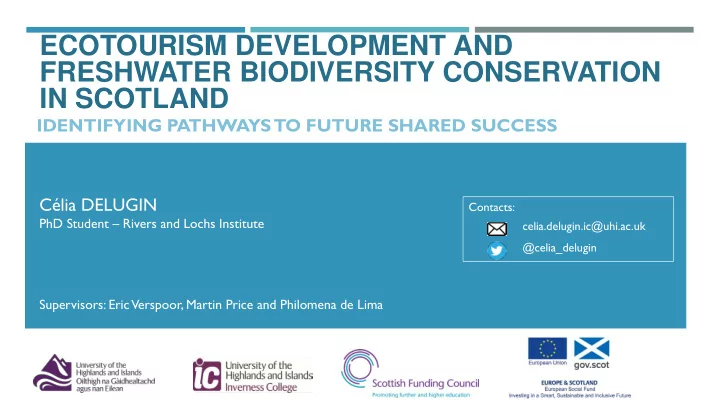

ECOTOURISM DEVELOPMENT AND FRESHWATER BIODIVERSITY CONSERVATION IN SCOTLAND IDENTIFYING PATHWAYS TO FUTURE SHARED SUCCESS Célia DELUGIN Contacts: PhD Student – Rivers and Lochs Institute celia.delugin.ic@uhi.ac.uk @celia_delugin g Supervisors: Eric Verspoor, Martin Price and Philomena de Lima
Wester Ross FisheriesTrust Design by Peter Cunningham and Robin Ade
Wester Ross FisheriesTrust Design by Peter Cunningham and Robin Ade
Wester Ross FisheriesTrust Design by Peter Cunningham and Robin Ade
BACKGROUND – ECOTOURISM AS A CONSERVATION TOOL? “Responsible travel to natural areas that conserves the environment, sustains the well-being of the local people, and involves interpretation and education” (TIES, 2015).
BACKGROUND – ECOTOURISM AS A CONSERVATION TOOL? “Responsible travel to natural areas that conserves the environment, sustains the well-being of the local people, and involves interpretation and education” (TIES, 2015). Source: Habitat for Humanity Source: Marine GEO
BACKGROUND – ECOTOURISM AS A CONSERVATION TOOL? “Responsible travel to natural areas that conserves the environment, sustains the well-being of the local people, and involves interpretation and education” (TIES, 2015).
OBJECTIVES Collating information on what is known (and unknown) about freshwater communities and their potential for ecotourism Engage with stakeholders to define the scope and approaches that might be taken in Scotland to freshwater biodiversity capital
CASE STUDY AREAS Loch Ness Loch Maree Loch Rannoch
CASE STUDY AREAS Tourism sector built largely around the Nessie “monster” legend Global brand recognition Diverse community Loch Ness Source: Surgeon’s Photograph Source: South Loch Ness
CASE STUDY AREAS Potential of the newWester Ross Biosphere designation North Coast 500: issues and challenges Historically a fishing destination Loch Maree Source: Wester Ross Fisheries Trust Source: North Coast 500
CASE STUDY AREAS Remote loch Fishing destination Increasing tourism issues Loch Rannoch Dynamic local communities Source: Loch Rannoch Conservation Association
METHODOLOGY Mixed method approach Conservation bodies Review Quantitative Qualitative Literature, Visitor survey In-depth interviews historical records, archives and Visitors Tourism databases industry Summer 2019 Focus groups Local communities
METHODOLOGY Conservation Perceptions and views bodies Engagement Knowledge Initiatives and collaboration Visitors Tourism Conflicts and challenges industry (Demographics) Local communities
PRELIMINARY RESULTS Conservation Definition of ecotourism bodies Desirability of tourism Information flux Conservation issues in freshwater Fast vs Slow tourism “Covert/Indirect” approach Levels of immersion Low knowledge and connection Lack of information available Visitors Tourism industry Local communities
THANK YOU FOR LISTENING ANY QUESTIONS?
Recommend
More recommend